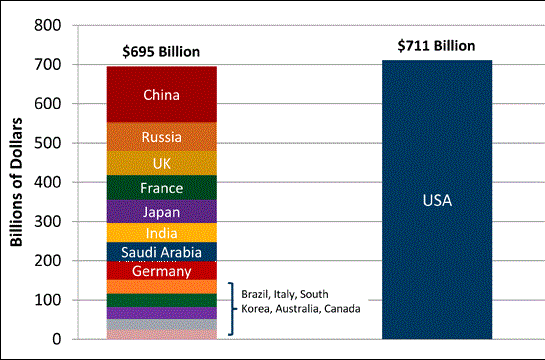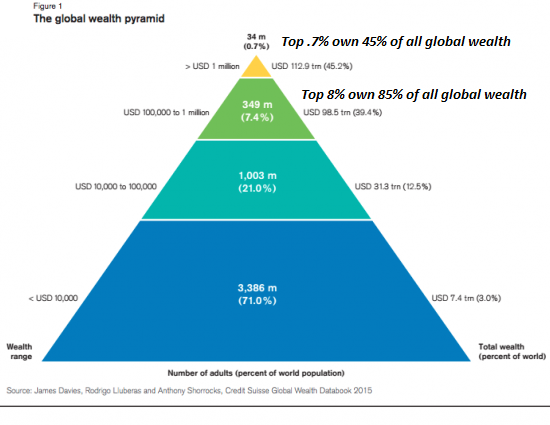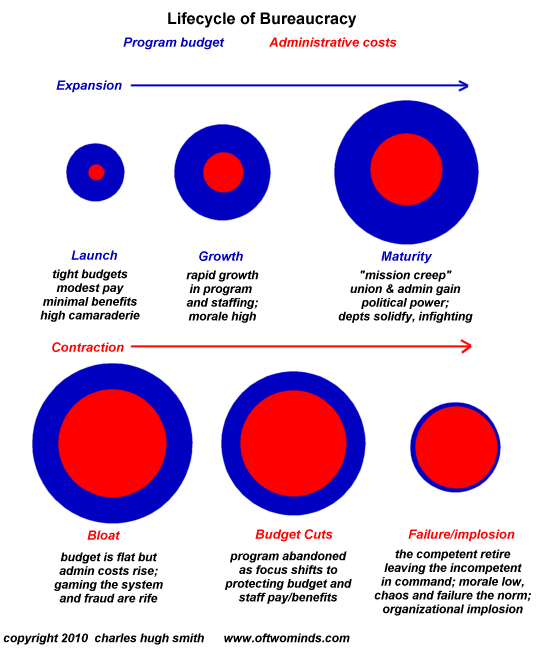The Three Stages of Empire
September 21, 2016
I consider it self-evident that we are in the third and final stage of self-serving Imperial decay.
Though Edward Luttwak's The Grand Strategy of the Roman Empire: From the First Century CE to the Third is not specifically on the rise and fall of empires, it does sketch out the three stages of Empire.
Here is the current context of the discussion of Imperial lifecycles: the U.S. defense budget is roughly the same size as the rest of the world's defense spending combined:

Luttwak describes the first stage of expansion thusly:
"With brutal simplicity, it might be said that with the first system the Romans of the republic conquered much to serve the interests of the few, those living in the city--and in fact still fewer, those best placed to control policy."
The second stage spread the benefits of Empire much more broadly:
"During the first century A.D., Roman ideas evolved toward a much broader and altogether more benevolent conception of empire... men born in lands far from Rome could call themselves Roman and have their claim fully allowed, and the frontiers were efficiently defended to defend the growing prosperity of all, and not merely the privileged."
The third stage is one of rising inequality:
"In the wake of the great crisis of the third century, the provision of security became an increasingly heavy charge on society, a charge unevenly distributed, which could enrich the wealthy and ruin the poor. The machinery of empire now became increasingly self-serving, with its tax collectors, administrators and soldiers of much greater use to one another than to society at large."
That line describes the American state and central bank perfectly. The burdens of an increasingly self-serving hierarchy are falling most heavily on the middle and upper-middle class, while bread and circuses (i.e. Medicaid-paid opiates) are freely distributed to the restless masses to distract them from the immense concentration of wealth and power at the top of the pyramid:

At some point, Collapse Is Cheaper and More Effective Than Reform (November 5, 2015). The third stage Luttwak describes can be broken down into a chart of the Lifecycle of Bureaucracy, for every Imperial Project is ultimately the combination of a vast concentration of wealth/power and the sclerosis of self-serving bueaucracies that serve themselves rather than society at large:

I consider it self-evident that we are in the third and final stage of self-serving
Imperial decay. That said, we don't have to follow that trajectory; we can fashion a much better
future outside the status quo, as I outline in
A Radically Beneficial World.
If you find value here, please consider
becoming
a $1/month patron of my work via patreon.com.
My new book is #5 on Kindle short reads -> politics and social science: Why Our Status Quo Failed and Is Beyond Reform ($3.95 Kindle ebook, $8.95 print edition) For more, please visit the book's website.
NOTE: Contributions/subscriptions are acknowledged in the order received. Your name and email remain confidential and will not be given to any other individual, company or agency.
|
Thank you, Kristina B. ($10), for your sumptuously generous contribution to this site-- I am greatly honored by your support and readership. |

Discover why Iím looking to retire in a SE Asia luxury resort for $1,200/month. |